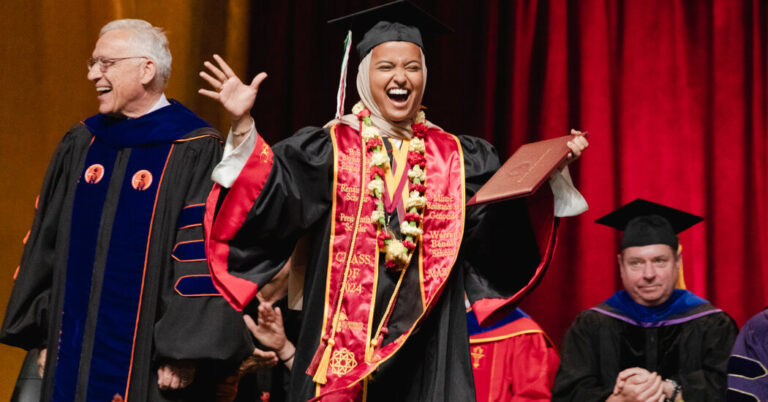For weeks, University of Southern California valedictorian Asna Tabassum was at the center of a whirlwind that upended the school’s long-standing graduation traditions and left leaders of campus struggling.
School administrators said last month that it would have been too dangerous to let her speak at a school-wide ceremony after pro-Israel groups condemned Ms. Tabassum’s selection, a Muslim student who sympathized with Palestinians on social media. She became the target of criticism and harassment.
But at her graduation ceremony Friday morning, Ms. Tabassum received her diploma to cheers and loud applause from students and parents.
In just a few weeks, Ms. Tabassum went from a relatively obscure student at USC Viterbi’s engineering school to a national symbol of free speech and a voice for the Palestinian cause. She still has critics — a conservative nonprofit this week paid for a mobile billboard near campus that attacked her — but also won over students and academics who felt she had been unfairly processed by the university.
Since the school canceled Ms Tabassum’s speech, there have been protests against the decision and against the war in Gaza. The first of the protests resulted in a quick crackdown ordered by the school’s president, Carol Folt, and 93 arrests by the Los Angeles Police Department.
A subsequent protest was able to linger on campus for days, a sign that Dr. Folt and USC leaders had softened their approach. But that too was shut down early Sunday, this time without any arrests.
“The world is in anguish and it is suffering,” Yannis Yortsos, the dean of the engineering school, told students on Friday. “International events take place thousands of miles away, in different parts of the world, but we feel them here on our campuses. Through this, you demonstrated dignity, moral compass, and true grace.
Some universities have faced disruptions during protests at graduation ceremonies, including Friday at the University of California, Berkeley, where some law school graduates chanted slogans during their speeches. But USC’s engineering graduation Friday was drama-free. There were no explosions or visible signs of protest, apart from a few students wearing keffiyehs, a checkered scarf that has become a symbol of the pro-Palestinian movement.
However, traces of the turbulence of recent weeks were still visible on campus Friday. Entrances to campus were tightly controlled, and signs posted along campus walkways warned that the university reserved the right to expel anyone disrupting graduation ceremonies.
Ms. Tabassum did not give a speech at the engineering school’s ceremony Friday and declined to speak to a reporter after the event. Despite the intense attention paid to her, she looked like any other graduate, smiling and taking photos with friends, and applauding her classmates when a speaker chose their course of study.
In the end, it may have been Ms. Tabassum who had the last word. The Daily Trojan, the student newspaper, published what was presented as the speech that she had hoped to give. After the initial greetings, Ms. Tabassum blacked out the rest of the content, contenting herself with congratulations and thanks.
Shawn Hubler contributed reporting from Los Angeles.


